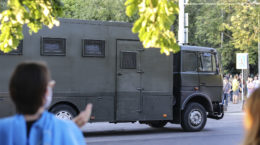The amendments to the Criminal Code of Belarus make it clear that Aliaksandr Lukashenka is not only fearing to lose control over his own army, but is deathly afraid our campaign «NO Means NO» will be successful and the Belarusian military men will massively desert the army and flee abroad. That is why, Lukashenka is tightening its grip on the servicemen and threatens them with death penalty not only for desertion abroad, which the Belarusian regime uniquely interprets as «high treason», but also for contacting human rights organizations and mass media and passing important information to them.
On February 21, 2023, the deputies of the House of Representatives of the National Assembly (Belarusian parliament, fully controlled by Lukashenka) approved in the second reading amendments to the Criminal Code, in particular, they introduced criminal liability for discrediting the army and death penalty for high treason. Before that, a draft law had been adopted «On the amendment of criminal codes». As it was announced, the objective of preparing the draft law was «to take proactive measures for committing offenses of extremist (terrorist) character by introducing amendments to the Criminal Code and to the Code of Criminal Procedure». Mentioning «offenses of extremist (terrorist) character» (e.g., Our House is on the list of «extremist organizations», and the human rights defender Olga Karach is «a person relatable to terrorist activity») directly indicate who the new amendments to the Criminal Code are adopted against and clearly shows that Lukashenka is thus trying to suppress any contacts between human rights defenders and mass media with members of the armed forces threatening the latter with probability of death penalty.
The number of the adopted modifications and amendments is great indeed. For example, the Article 369-1 of the Criminal Code is supplemented by a qualifying factor providing for the «establishment of responsibility for dissemination of knowingly false information discrediting the Armed Forces, other troops and military formations, paramilitary organizations of the Republic of Belarus». It’s a shot at the campaign «NO Means NO», and translated into the human language it means that human rights monitoring reports about the state of the Belarusian army, prepared by Our House, are affected by this law and, accordingly, labeled as «knowingly false information» and criminalized. «Knowingly false information» means any true information that the Belarusian regime does not like for some reasons.
Also, new articles appeared: Article 289-1 «Propaganda of terrorism» (this term is usually used by the Belarusian regime for the distribution of any information about the activity of human rights organizations in exile and independent mass media in exile, that it has recognized as «extremist»), and Article 375-2 «Violation of the requirements for the protection of state secrets» (does it mean such activity had not been punishable before?).
Now, enforcers got the right to detain individuals suspected of high treason, conspiracy, espionage, agent activity, acts of terrorism under Articles 356 – 358-1 of the Criminal Code for the term up to 10 days, and to bring charges against the detained in the term of 20 days from the moment of arrest.
However, the KGB denunciators got some relief: Article 125 of the Criminal Code was amended by a correspondent note of release from criminal liability for an individual who participated in preparation to attack an institution under international protection (meaning, foreign embassies of Belarus) if that individual assisted in preventing the crime by timely warning of the state bodies or by other means.
Besides that, the Criminal Code was supplemented by the Article 375-2 «Violation of the requirements for the protection of state secrets», providing for the criminal liability for «for intentional unlawful transfer of a holder of state secrets holding the secrets of the Republic of Belarus or foreign states, transferred to the Republic of Belarus, outside the Republic of Belarus». Translated into the human language, it means there’s criminal liability for any help provided to a serviceman in his attempt to escape from the army abroad. Providing such help to a deserter in fleeing Belarus and going abroad will be punishable with up to 5 years of imprisonment.
Some time before, the press service of the House of Representatives indicated that the draft law «On the amendment of criminal codes» was needed to produce «deterrent effect on destructive elements» («destructive elements» is the term used by the Belarusian regime’s propaganda to call us, human rights defenders in exile) and to «demonstrate decisive fight with high treason» (i.e., attempts to run here to us or to contact us by any communication method).
In May, 2022, Aliaksandr Lukashenka signed amendments to the Criminal Code of Belarus introducing death penalty for attempted acts of terrorism. Before that, a death penalty was not applied to preparation of a crime or to an attempted crime. Adoption of those amendments was connected to such phenomenon as «Belarusian railway partisans» who are conducting non-violent actions blocking railway transportation to create obstacles for the movement of military trains, mostly Russian.
The article about high treason has existed in the Belarusian Criminal Code for a long time. It also existed in the Criminal Code which Belarus inherited from the BSSR (Belarusian Soviet Socialist Republic) (adopted in 1960 and acted till 2000 with numerous amendments and additions) and bore the number 61.
Then, such crime meant active collaboration with foreign states whose aim was «to destroy the independence of Belarus, separate part of its territory or destroy its army»: the text underlined that the article was about the external security of the country. The article mentioned specifically «bodies or representatives of foreign states», which made it obvious that both the fact of such collaboration and the malicious intent of the defendant were to be proven at court. If translated into the human language, the term «foreign states» usually meant the USA and NATO countries which according to the narratives of the Belarusian regime’s propaganda are constantly encroaching on the independence of Belarus and its «unique path to democracy».
In 1999, a new Criminal Code code was adopted in Belarus, which preserved the high treason article moving it closer to the end of the document and giving it the number 356. Also, now it contained two parts: a crime of murder, for example, was punishable by death. The years that followed brought further changes.
During the years of the independence of Belarus and formation of the dictatorship of Lukashenka, the high treason article in the Belarusian Criminal Code has drastically changed. From a very specific and clear crime, implying collaboration with foreign intelligence and transferring state secrets to them, «high treason» turned into an extremely broad and stretchable concept that can be applied to literally any cooperation with foreign organizations like, for example, UNO, OSCE or PACE, not to mention Belarusian human rights organizations in exile in a NATO country, like Our House. The wording «national security» allows to classify a broad variety of actions as offenses of the Criminal Code, and not those specific actions stated in the Code before.
The important thing is, the liability under the article allows the punishments to become drastically tougher, and the return of the death penalty as a punishment for «traitors» working for the state speaks loudly about that.
Who has already been punished for «high treason» in Belarus
The following people have already been punished for «high treason» in Belarus:
- Dzianis Urad, a captain of the Armed Forces’ General Staff (18 years of imprisonment in a penal colony);
- Katsiaryna Andreyeva, a journalist of Belsat (8 years and 3 months of imprisonment);
- Dzianis Ivashyn, an investigative journalist (14 year of imprisonment in a penal colony);
- Andrei Aliaksandrau, a media manager (14 years of imprisonment);
- Dzmitryi Klimau and Uladzimir Auramtsau, «railway partisans» from Bobrujsk (22 years of imprisonment);
- Dzmitry Ravich, Dzianis Dzikun, Aleh Mauchanau, «railway partisans» from Svetlagorsk (22, 23 and 21 years of imprisonment in a penal colony correspondingly);
- ten defendants in the Rabochy Rukh case (sentenced to from 11 to 15 years of imprisonment);
- Yauhen Hlushkou, a resident of Gomel district (9 years of imprisonment in a penal colony);
- Mikalai Autukhovich, a businessman and an activist (25 years of imprisonment in a penal colony).
May 14, 2021
In Belarus, Dzianis Urad, a captain of the Armed Forces, was sentenced to 18 years of imprisonment for having published the document about involvement of the Belarusian military into dispersal of the peaceful protesters in the country. He was accused of high treason.
The captain was detained in March, 2021. Investigators stated, that Dzianis Urad had photographed the secret order of the minister of internal affairs of Belarus to the defense minister about «attracting members of the Armed Forces to the activities of law enforcement», i.e., to the dispersal of peaceful protests in Belarus. Captain Urad sent the photo to Telegram channels which published it.
The Supreme Court of Belarus found the 29-year-old Dzianis Urad guilty of high treason, committed by a person with a military rank. He was sentenced to 18 years of imprisonment – the heaviest sentence passed since the beginning of protests in Belarus at the time. The sentence is effective and not subject to appeal. The severity of the sentence gives a clear signal to all the military servicemen of Belarus that Lukashenka is going to use the cruelest measures against them in order to suppress any attempts to contact democratic structures.
The Prosecutor-General’s Office of Belarus substantiated the charge saying that the actions of Dzianis Urad allegedly represented a threat to national security. However, human rights defenders do not agree. They consider the captain to be a political prisoner. The International Covenant on Civil and Political Rights states that it is not possible to speak of high treason and official secrets, when speaking about an attempt to withhold information that is of interest to the public and not threatening the national security. According to human rights defenders, Dzianis Urad acted in the public interest, because involvement of the army to disperse peaceful protesters is forbidden.
June 13, 2021
Gomel Regional Court sentenced Katsiaryna Andreyeva, a journalist of Belsat, to 8 years and 3 months of imprisonment on the charges of high treason (Part 1 Art. 356 of the Criminal Code). The trial took slightly more than a week: the first court session took place on July, 2021; on July 6, the court adjourned the hearing till July 13. The trial was closed.
In February, 2021, the journalist Katsiaryna Andreyeva was sentenced to two years of imprisonment for broadcasting the peace rally in memory of Raman Bandarenka from the Square of Change. On November 12, 2020, the artist Raman Bandarenka, attempting to prevent the destruction of the historic white-red-white symbols in his courtyard (the Square of Change), was brutally beaten and kidnapped in a minibus by a group of unknown people wearing civil clothes and masks. Some time later he was taken by an ambulance from the Central Office of Internal Affairs to hospital where he died without regaining consciousness. The journalist was supposed to be released on September 5, 2022. However, a new criminal case was launched against Katsiaryna Andreyeva in February, 2022; this time she was charged with high treason.
The act of «high treason» the journalist was accused of involved «transferring secrets of the Republic of Belarus to a foreign state, international or foreign organization or their representatives». The «secret of the Republic of Belarus» was the reportage about the murder of the artist Raman Bandarenka by Belarusian enforcers for the independent Belarusian mass media, Belsat, working in exile in Poland.
September, 14, 2022
In Belarus, the journalist Dzianis Ivashyn was sentenced to 13 years and 1 month of imprisonment. He was accused of interference with the activities of an internal affairs officer, high treason and collaboration with Ukrainian intelligence. The trial was closed.
His last article that the Belarusian enforcers reacted to was dedicated to former employers of the Ukrainian Berkut working in the Belarusian power structures.
Former employers of the Ukrainian Berkut, who had been killing Ukrainians during the Maidan, turned out to have found shelter and jobs in the Belarusian power structures and participated in the bloody dispersal of the Belarusian citizens during the protests-2020. That is, Dzianis Ivashyn was accused of high treason because he had unearthed information about participation of the foreign Ukrainian pro-Russian gunmen in the violence against peaceful Belarusian citizens.
Ivashyn was brought charges against under two articles: Art. 365 (interference with the activities of an internal affairs officer) and Part 1 Art. 356 (high treason) of the Criminal Code of Belarus. The judge Valery Ramanousky found him guilty and sentenced him to 13 years and 1 month of imprisonment in a maximum-security correctional facility. Besides that, Ivashyn was also imposed a fine on in the amount of 150 basic units (4800 BYN). In addition, he is to pay a compensation for «emotional damage» to the victims in the amount of 2000 BYN each. It is not known who the victims are. In total, the journalist has to pay 22800 BYN, or over 9000 USD.
Before the trial, Dzianis Ivashyn had spent about 18 months behind bars. First, he was brought charges against under Art. 365 of the Criminal Code (interference with the activities of an internal affairs officer), later the charges under Article 356 (high treason) were added. Besides that, the KGB accused Dzianis Ivashyn of collaboration with the intelligence of Ukrainian diplomats in Minsk and Brest.
October 6, 2022
Minsk Regional Court sentenced the defendants of the BelaPAN case to imprisonment to the terms from 4 to 14 years in a penal colony. Iryna Leushyna, the editor-in-chief of BelaPAN, was sentenced to 4 years, Dzmitry Navazhylau, the director of BelaPAN in 2018-2021, was sentenced to 6 years, Andrei Aliaksandrau, the deputy director in 2014-2018, was sentenced to 14 years and his wife Iryna Zlobina – to 9 years of imprisonment in a penal colony.
Andrei Aliaksandrau and Iryna Zlobina were accused of «preparation of at least 260 individuals in the period from August 14, 2020, till January 12, 2021», to participate in the «gross violation of public order» «by means» of payment of fines, bills for the food in detention facilities, lawyers’ services, etc. (Part 2 Art. 342 of the Criminal Code), as well as of high treason (Part 1, Art. 356 of the Criminal Code). That is, it is referred to regular payment of fines imposed on the protesters, for parcels sent to the detainees in prisons, payment of lawyers’ bills, and so on – all things, that Our House was doing as well, for what a number of women human rights defenders of Our House were subject to repressions and even imprisonment.
October 17, 2022
Grodno Regional Court passed the verdicts to the defendants in the Autukhovich case and sentenced them to imprisonment from 2.5 to 25 years of imprisonment. The longest term was appointed to Mikalai Autukhovich: he was sentenced to 15 years of imprisonment in a penal colony. He was accused under 12 articles of the Criminal Code of the Republic of Belarus, «high treason» and «act of terrorism» among them. Besides the imprisonment, the oppositionist was imposed a fine on in the amount of 32 thousand BYN (about 13500 EUR). Also, the court stripped Mikalai Autukhovich of his rank of the retired senior warrant officer. He is going to spend the first five years in prison, and the remaining term – in a penal colony.
Pavel Sava, the animal rights defender Volha Mayorava and Halina Dzerbysh were sentenced to 20 years of imprisonment in a penal colony each. Besides other charges, they were accused of «participation in a criminal organization and attempted seizure or retention of state power in the unconstitutional way».
Pavel Rezanovich and Viktar Snehur were sentenced to 19 years in a penal colony and Uladzimir Hundar – to 18 years of imprisonment. The court appointed a 17-year term of imprisonment in a penal colony to Iryna Melkher, 16 and 15 years of imprisonment to Siarhei and Liubou Rezanovich correspondingly.
Iryna Harachkina was sentenced to 6 years and 1 month in a penal colony and Anton Melkher – to 2 years and 6 months of imprisonment. Melkher was released in the courtroom, as the time he had spent in the pre-trial detention was counted as the punishment term.
According to the investigation, Mikalai Autukhovich and «members of the organized group», in the early hours of October 2, 2020, «prepared incendiary fuelю, poured it over a car Audi 80 and a one-storied building in Volkovyssk, belonging to a police operative, who had used cruel violence against the peaceful protesters, and set the car and the building on fire. In November, 2020, Mr. Autukhovich and «other members of the criminal organization» allegedly prepared an improvised explosive device and blew up a car belonging to a police operative. By that criminal case, Aliaksandr Lukashenka wanted to show that he protected those enforcers who helped him to hold power by force.
Mikalai Autukhovich is a businessman, an Afghan war veteran, a creator of a successful taxi fleet in his native town of Volkovyssk in Grodno region. He openly opposed Lukashenka, and in 2004 ran for parliament. After Mikalai Autukhovich started criticizing Lukashenka, his firm was subject to active multiple state inspections, and in 2006 a criminal case was opened against him on the charges of tax evasion which resulted in his 3.5-year imprisonment. Mikalai Autukhovich was released in 2008, human rights defenders acknowledged him a political prisoner.
December 27, 2022
A court in Belarus passed the verdicts to three «railway partisans» sentencing them from 21 to 23 years of imprisonment each. Dzmitry Ravich was appointed 22 years and Dzianis Dzikun – 23 years in a maximum-security correctional facility; Aleh Mauchanau was sentenced to 21 years of imprisonment in a penal colony.
All the three were accused of participation in an extremist group (Part 3 Art. 361-1 of the Criminal Code), of an act of terrorism committed by an organized group with grave consequences that create danger to people’s life (Part 3 Art. 289 of the Criminal Code), damaging the railways (Parts 2 and 4, Art. 309 of the Criminal Code), high treason (Part 1, Art. 356 of the Criminal Code).
The investigation claimed that the 29-year-old dweller of Svetlagorsk «joined an extremist formation» in February, 2022, and received a task to «to incapacitate the railway infrastructure in the territory of Gomel region» with the aim to interfere with the movement of the Russian military hardware in the territory of Belarus.
According to the investigation, the man «offered his friends, 33 and 50 years old, to join the criminal group». The communication of the state body said that «representatives of extremist formations had paid all their expenses for preparation of the crime, and transferred them the payment for the job done to a digital wallet», a little over 1000 BYN (about 364 USD).
The investigation claimed that all the three men «on the night of February, 28, to March, 1, according to the task received, set a relay control cabinet and its equipment on fire», thus, causing a damage in the sum of over 55 thousand BYN (about 20 thousand USD). The KGB has put Dzmitry Ravich, Dzianis Dzikun and Aleh Mauchanau on the list of individuals «involved in terrorist activity».
January 26, 2023
A court in Belarus sentenced a dweller of the village Ziabrovka, Yauhen Hlushkou, to 9 years of imprisonment in a penal colony on the charges of high treason (Part 1, Art. 356 of the Criminal Code of the Republic of Belarus) and «assisting an extremist formation» (Part 1, Art. 361-4 of the Criminal Code of Belarus).
According to the investigation file, Yauhen Hlushkou «deliberatly assisted a foreign state in the territory of Gomelsky and Rechitsky districts to conduct an activity intentionally injuring the national security of the Republic of Belarus».
The man was accused of «collecting, registering and analyzing intelligence-related information about objects of the military equipment and infrastructure, including Belarusian military objects. Furtheron, with the use of the Telegram messenger, he transferred the obtained data to a chat bot, controlled by a foreign organization». Usually, this is what the regime’s propaganda calls Belarusian Telegram channels working in exile.
Belarusian enforcers detained Yauhen Hlushkou in the middle of November, 2022, on suspicion of espionage in favor of Ukraine. The motive for the detention was an old photo of an airfield which Yauhen had made with a drone, and phone numbers of several Ukrainian citizens, found on his phone.
Yauhen Hlushkou is a veterinarian, he was working in one of Gomel clinics. Prior to the full-scale invasion of Ukraine by Russia, the man had lived for a long time in China, but was forced to return to Belarus due to the pandemic.
It became known that the troops of the Russian Federation used the airfield of Ziabrovka in the first days of Russia’s war against Ukraine. Airplanes bombing Ukraine regularly took off from that airfield. The distance between Ziabrovka and Ukraine is only about 50 km.
February 10, 2023
Mogilev Regiona Court passed the sentence to three «railway partisans»: Dzmitryi Klimau, Uladzimir Auramtsau and Yauhen Minkevich from Bobrujsk. Dzmitryi Klimau and Uladzimir Auramtsau were sentenced to 22 years of imprisonment, Yauhen Minkevich – to 1.5 years. Under the amnesty act, Yauhen Minkevich was dispensed from serving the sentence partly for the term of one year. Taking into account the time he had spent in custody; his sentence is considered to have been served.
The three men were charged under several articles of the Criminal Code, including the act of terrorism (Art. 289 of the CC), intentionally bringing the railways into a state unsuitable for further use with the aim to commit an act of terrorism (Art. 309 of the CC) and high treason (Art. 356). The judge Ihar Shvedau examined the case behind closed doors for two weeks.
According to the prosecution, the three men allegedly destroyed two relay control cabinets of signaling arrangement near Osippovichy on March 28, 2022, with the aim to stop movement of the Russian military hardware and troops across the territory of Belarus in the direction of Ukraine. After their detention, an audio was published from a briefing of the deputy interior minister Henadz Kazakevich. He claimed that three residents of Bobrujsk were detained on the night of March 30, 2022, by the police in collaboration with the KGB operatives «with the support of the SOBR units».
The enforcers used lethal weapons against the unarmed people during the arrest. Kazakevich explained that it was needed because allegedly the detainees actively resisted and tried to escape. In the result, one of the detainees was wounded and placed in a medical facility, while the other two were treated at the scene. The state body claims, that in their car two radio sets were found, as well as a «specially made device for getting a rolling stock off the tracks», meaning a rolling stock carrying Russian military hardware.
February 17, 2023
Gomel Regional Court sentenced participants of the Rabochy Rukh movement to imprisonment for the term from 11 to 15 years in a penal colony. Nine activists were defendants in the case: Siarhei Shelest, Uladzimir Zhurauka, Andrei Paherila, Hanna Ablab, Aliaksandr Hashnikau, Siarhei Dziuba, Ihar Mints, Valiantsin Tseranevich, Siarhei Shametska, Aliaksandr Kapshul. They were accused of high treason (Part 1, Art. 356 of the Criminal Code of the Republic of Belarus), as well as under a number of other articles of the Criminal Code.
The shortest term, 11 years of imprisonment in a penal colony, was appointed to Hanna Ablab. Four participants of the movement, Siarhei Dziuba, Ihar Mints, Valiantsin Tseranevich, Siarhei Shametska, were sentenced to 12 years of imprisonment in a penal colony. Siarhei Shelest, Andrei Paherila and Aliaksandr Hashnikau were sentenced to 14 years of imprisonment. The haviest punishment, 15 years of penal colony, was appointed to Aliaksandr Kapshul and Uladzimir Zhurauka.
The prosecution claimed that the participants of the Rabochy Rukh movement had collected and passed to foreign states, organizations and their representatives, including special services of the USA and Lithuania, information of restricted character concerning Belarusian economic entities about means of bypassing restrictive measures (sanctions), as well as about mechanisms of countering such measures. It was communicated, that some defendants had been planning ways to block the production process at JSC Grodno Azot and BSW.
That is, work aimed at introduction of economic sanctions against enterprises of Lukashenka is also considered «high treason», which is today punishable by death.
The situation as of today
Apparently, now, after tightening the corresponding legislation and expanding the powers, the special services of Belarus will «detect» «traitors» much more actively, and first of all, among the military personnel.
Not long ago, at the seating of the Council of the Republic, the head of the KGB, Ivan Tertel, claimed that operatives of the KGB of Belarus had detained over ten employees of uniformed agencies and public servants recruited by foreign special services since the beginning of 2023.
«The KGB is observing a sharp increase in the activity of various kinds of intelligence of special services of the collective West against the Republic of Belarus. The main focus is on the recruiting work in relation to individuals that have access to and can obtain information of closed character, recruitment of operatives of uniformed agencies and employees of the state apparatus. Taking into consideration the aggressive activity of foreign special services aimed at infiltrating our uniformed agencies and state apparatus (by the way, the KGB has detained over 10 traitors since the beginning of this year) and the substantial damage caused to the national interests, the situation demands taking complex measures to neutralize such threats», said the head of the KGB Ivan Tertel.
He also claimed that «our enemies are planning further measures to destabilize the situation in the country»: «Their plans go as far as to the period of 2024-2025. The whole context here is connected to their pursuing our government agencies, to committing actions aimed at destabilizing the country. Accordingly, we report about such threats to the head of the state, suggest to elaborate certain measures aimed, first of all, at preventing such threats, and second, at actual creation of impact mechanisms».
According to the head of the KGB, the current edition of Art. 356 of the Criminal Code «High Treason» providing for increased responsibility for high treason of the officials at corresponding positions or of the military personnel, does not cover all the corresponding categories of the civil servants.
«Due to that, it is suggested to enlarge the increased responsibility to the categories of «public officials holding public office» which would unite all representatives of the authorities. Besides that, it is suggested to toughen punishments for high treason up to the application of the exceptional measure – death penalty. Such measure is, by the way, provided by the legislation of the USA (separate states), China, Egypt, Iran, Syria, the UAE, Jordan and several other countries. Implemented in exceptional cases, such measure will become a serious deterrent for potential traitors. First of all, we treat this measure as preventive, directed at elimination of serious crimes against the state», said the head of the KGB.
That is, the head of the KGB considers application of death penalty to be a «preventive measure».
Our House is firmly opposed to application of the death penalty against the military personnel and makes a statement that desertion abroad with the aim to avoid participation in the war against Ukraine is not high treason, but is an act of heroism and civil courage of a Belarusian man.
In addition, Our House strongly protests against usage of the «high treason» article against individuals for transfer of information regarding the public security of Belarusians to human rights defenders or to the independent mass media. Despite the way the term «high treason» is interpreted by the KGB, the Ministry of Defense, other uniformed agencies or Lukashenka himself, transferring important information that can help prevent and block the Belarusian army from the participation in the war against Ukraine is a civic duty of any Belarusian citizen, including a military person.
No to participation of the Belarusian army in the war against Ukraine!










